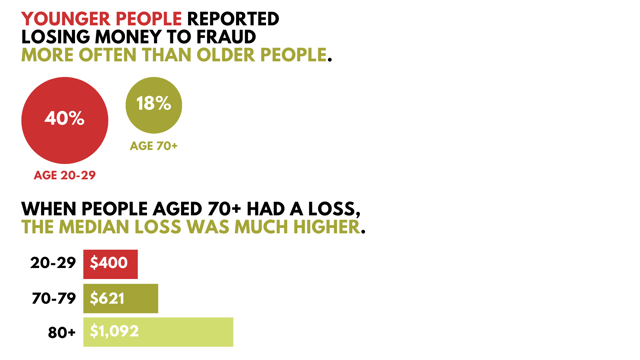
Scammers are our number one adversary.
We work to help our community reach their financial goals, scammers work hard to bilk unsuspecting people out of their hard-earned money.
We're committed to your safety, scammers are committed to stealing your information and use it for bad stuff.
Scams are a huge threat — not just to the U.S., but the world. Last year, a reported $1.48 billion was lost to fraud. Not million, billion. With the rise of the internet, scammers can now cast a wider net to snag their victims, making falling for a scam as easy as missing your turn.
As a defender of finances, we did the research and identified the top tricks scammers use on members.
And before you say you’re too smart to be swindled because you grew up with the internet, take a look at these numbers.
According to a report from the Federal Trade Commission (FTC), millennials are particularly more vulnerable to online scams than seniors, as shocking as it may seem. The research finds that 40% of adults age 20-29 who have reported fraud ended up losing money in a fraud case.

Source: Federal Trade Commission
Regardless of your age, one thing is for certain. If you're aware of these scams, you're a lot less likely to fall for them. Here's a list of the top scams aimed at members and how to avoid getting duped.
The Nigerian scam
The oldest and most popular internet scam, Nigerian scams involve someone overseas reaching out to you through email or social media with an elaborate request to send you a large sum of money, stating that they cannot access it where they live because of government restrictions. In exchange for your help, the scammer offers you a percentage of their riches. They will be persistent and ask you to pay more and more money for additional services, such as transactions or transfer costs. You may even receive papers that make it seem real. In the end, you are left broke and without any of the promised money.
These scams are also called “Nigerian 419” scams, after the section of Nigeria’s Criminal Code which outlaws the practice. While these scams originated in Nigeria, they now come from all over the world.
Americans lost $703,000 last year to these types of frauds, according to a new report by ADT Security Services, using data from the Better Business Bureau’s Scam Tracker.
How to avoid this scam: Experts say these types of emails are typically unexpected and from an unknown sender. Some email providers may even automatically send these to your spam folder. If you receive an email that seems sketchy, keep an eye out for red flags such as poor grammar and mention of a bank, government agency or other organization that requires fees to be paid before the money can be moved.
The deposit scam
Also known as check overpayment fraud. If you’re selling something online, you may get a response from someone offering to use a cashier's check, personal check or corporate check to pay for the item you're selling. The buyer will send you a check for more than the asking price, claiming it was a mistake and asking if you could wire back the difference after you deposit the check. By the time the check bounces, the scammer will have already ghosted. Thus, leaving you liable for the entire amount.
How to avoid this scam: If you ever receive a check that comes from an unknown party, use caution. Regardless of how insistent a buyer may be, never cash a check and immediately wire money from it. Talk to your credit union if you have any concerns about a payment you receive.
Gift card scam
Gift cards are a popular and convenient way to give someone a gift. They’re also an increasingly common way for scammers to steal money from you.
In this scam, fraudsters place a call or email to an unsuspecting victim with urgent news or a convincing story. They then ask, or in most cases pressure, the person to send them a gift card, like an iTunes or Google Play card. This scam is usually performed under some sort of veil and will sound sincere. For example, the fraudster might contact you and claim to be the IRS, tech support, family members or even your boss.
Depending on who the message appears to be from, the victim may feel pressure to quickly act on the transaction. If you were in this situation, would you feel comfortable questioning your boss about an urgent request? If the answer is no, then you're much more likely to fall victim to this sort of scam.
How to avoid this scam: If someone comes to you asking for a gift card, remember that gift cards are for gifts, not payments. You have two options: Either you don’t engage with the requester, or if it appears to be coming from somebody you know, pick up the phone and ask them about it.
Mystery shopper
If you ever see an advertisement or website claiming promoting the perks and pay of becoming mystery shopper, you should look the other way.
A mystery shopper is a person hired by a retail company to evaluate the quality of service in their stores. Typically, the shopper is reimbursed and can keep the product or service. Sometimes the shopper receives a small payment, as well.
Yes, this is a real thing people do. Unfortunately, the landscape is littered with fraudulent mystery shop company waiting to prey on people looking to get paid to shop These scam artists create websites where you can “register” to become a mystery shopper after paying a certification fee. The certification offered is almost always worthless. If you try to get a refund from the promoters, you will be out of luck.
How to avoid this scam: Honest companies pay you to work for them, not charge you. If the company asks you to pay upfront to get the opportunity, walk away. No real job opportunity, including mystery shopping, involves paying for the job. If you want to become a mystery shopper, you can easily find jobs and list of companies that use mystery shoppers on the internet for free.
Romance scams
Just when you thought it was safe to start dating online, scammers ruined everything by turning hopeless romantics into illegal money mules.
According to the FBI, in 2018, confidence/romance fraud was the seventh most commonly reported scam and the second costliest scam in terms of victim loss.
The scammer starts by meeting an unsuspecting victim through an online dating site or app using a fake photo as their profile pic. After earning the person’s trust, the fraudster tries to convince the poor victim to send money so they can, for instance, buy a plane ticket to visit, or pay for some tragedy in their life.
Here’s where it gets worse. In many situations, the victim unknowingly becomes a “money mule” — a term you may recognize from crime dramas like Scarface or The Wolf of Wall Street. A “mule” is someone who transfers money illegally on behalf of others. After developing a trusting relationship, the con artist convinces their victim to open a bank account under the guise of sending or receiving funds. Shortly after, the account is used to funnel money from any number of illegal activities. If the account is flagged by the financial institution, it may be closed and the cyber criminal will either persuade the victim to open a new account or begin grooming a new victim.
So far, the victim’s age, education and income bracket vary, but the FBI has identified women, senior citizens, and widows or widowers as the most targeted demographics.
How to avoid this scam: Online dating is a perfectly fine path to finding love, but it's important to use good judgment. Cyber criminals do not use their own photographs; they use an image from another social media account as their own. A reverse image search can determine if a profile picture is being used elsewhere on the internet, and on which websites it was used.
Fraud attempts start to spike around the holidays, so we recommend that all of our members download the MyCardRules app. It's 100% free and gives you the power to shut off your Louisiana FCU card at any time.
Sources:
https://www.consumer.ftc.gov/articles/0053-mystery-shopper-scams
Like this article? Subscribe to our blog and have great financial insights delivered to your inbox weekly.





